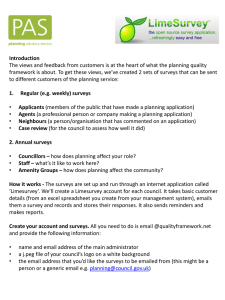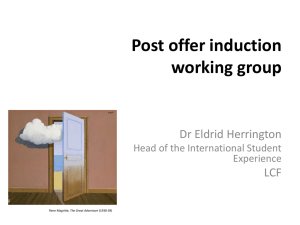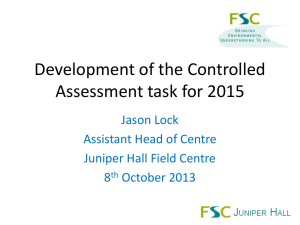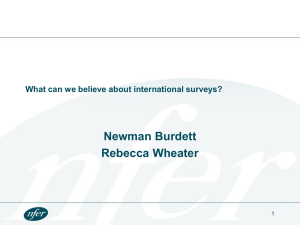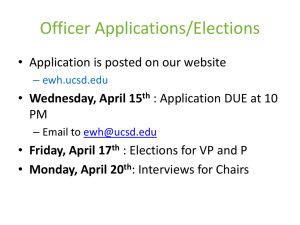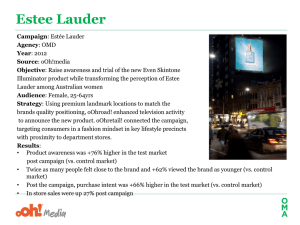The Student Experience Project.an overview.Sept 2013
advertisement
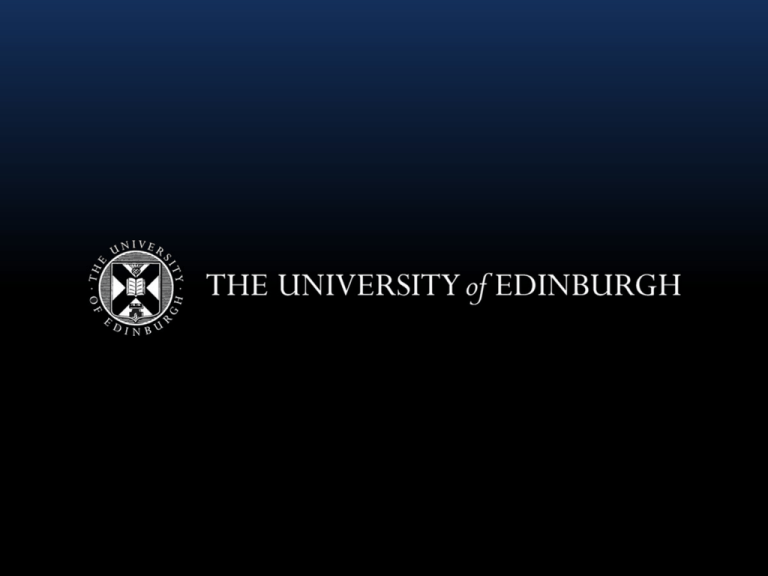
The Student Experience Project Overview Mark Wilkinson September 2013 Contents • • • • • • Background Aim Success criteria The ‘strands’ Delivery Next Steps Background • Why do we need a Student Experience Project? • Three major factors driving this: – Strategic goal of ‘world leading student experience’ – Responding to student feedback on their experience – Responding to recommendations from internal/external review Aim • The Student Experience Project aims to deliver a better understanding of the student experience; to pilot and implement developments to services and activities; and to enrich the experience of all students of the University • This will be achieved by adopting collaborative and partnership focussed methods Success measures • Higher levels of student satisfaction – Indicated by qualitative and quantitative research with students – External surveys such as the NSS, also Times Higher Education’s Student Experience Survey – Internal surveys undertaken by the Student Survey Unit eg ESES, New Student survey – Focus Group findings • Delivery of high level KPIs from 2012-16 Strategic plan: – Strategic goal: Excellence in education – Strategic theme: Outstanding student experience The strands • • • • • • • • • • • Enhanced Selection Pre-arrival and Induction Student Information Points Student Communication Peer Support Online and Innovation in Student Services Programme and Course Information Management Project (PCIM) Emergency Response Student Surveys School Councils Healthy University Enhanced Selection • Aim: To develop and pilot the use of enhanced admissions selection criteria that value diversity, and reflect the skills, attributes and knowledge required to succeed at Edinburgh. To develop tools to effectively communicate these expectations and the nature of our programmes to prospective students before they apply. • Chair of Task Group: Rebecca Gaukroger, Head of Admissions: • Project staff: Gillian Simmons, Senior Policy and Project Officer; Alyssa Newman, Admissions Project Officer Pre-arrival and Induction • Aim: To co-ordinate and enhance pre-arrival and induction support, enabling our diverse student population to successfully transition to university life and study. • Chair of TG: Ruth Stewart, Head of Academic Administration, College of Medicine and Vet Medicine • Project staff: • Jenni Murray and Kristen Hunger, Induction Co-ordinators • Abby Shovlin, Academic Induction Planner • Key Achievements: • Enhanced Academic Fair • Improved ‘New Students’ web site • Greater co-ordination of Induction/Freshers’ Week 2013 Student Information Points • • • • • • • Aim: To develop, implement and deliver an information service for students, and for the many staff who also have a role in supporting them Status: 2 face-to-face SIPs (Kings Buildings & Main Library), social media, email & text services set up. Stage two evaluation/planning process now underway; awareness raising campaign underway; benchmarking activities planned Project staff: Student Information Points Manager; SIP team x6 – Alun Evans, Jemma Allan, Amy Challacombe, Anna Guy, Lewis Scroggie, Summer Wight Key Achievements: Building from scratch and delivering a new student service in under 2 months Dissemination of a new University wide publicity campaign to promote awareness Increasing integration with other key information providers Peer Support • • • • • • • • Aim: To foster a sense of belonging within the student body and support students to develop strong inter-personal, communication and professional skills . To provide an opportunity for Schools/academics to receive ‘realtime’ feedback from students on multiple aspects of their student experience Status: year two of development Project staff: Katie Scott - Peer Support Co-ordinator; Mimi Watts Project Officer Key Achievements: peer support embedded now across all Schools; 200 student peers trained; 40 projects in place from Sep 2013; contributing to the HEA Students as Partners Summit presented on their work at the International Enhancement Themes Conference 2013 Student Communications • • • • • • • • • Aim: To consider and develop effective student communication practices to enrich the student experience and ensure that students are aware of, and can engage with, student support enhancements Status: Audit completed (including research with students & meetings with Schools). Communications Strategy developed covering digital & traditional channels; Task Group completed Project staff: Lucy Lamb and Kate Glencross, Student Communications Officers Key Achievements: Innovative Learning Week campaign Student Surveys campaign New Student News web site and newsletters On the Same Page campaign - http://www.ed.ac.uk/staffstudents/students/same-page Online and Innovation in Student Services • Aim: To develop, deploy and enhance web-based student support mechanisms and tools; to foster and enhance collaboration, partnership and integrated working between the support services and Colleges/Schools • Status: analysis of free text comments from ISB, PTES and PRES; audit of University online support resources and provision; pilot use of the Big White Wall. • Chair of TG: Shelagh Green, Director, Careers Service • Project staff: a post of Student Support Developer is being taken forward for recruitment. Programme and Course Information Management Project (PCIM) • Aim: To consider how we store, manage and use academic information; to enhance the student experience by providing accurate, consistent and useable information to support academic choice. • Status: This project strand is completing the scoping and initiation phase and will shortly seek approval for implementation from Learning and Teaching & Curriculum and Student Progression Committee • Chair of TG: Professor Ian Pirie • Project staff: Nichola Kett, Assistant Head and Project Manager, has been seconded to this role in Academic Registry. Emergency Response • Aim: To reflect on current support for students in emergency and crisis situations; to develop recommendations and consider the implications of these for implementation. • Status: Report and recommendations in draft form; Task Group drawing to a close and recommendations will be fed back to the project Steering Group. • Chair of TG: Bruce Nelson, College Registrar, College of Science and Engineering Schools Councils • Aim: To promote student involvement in learning and teaching, and academic community in schools. • Status: Project initiation phase – new for 2013/14. Sponsored by EUSA as lead stakeholder. Project Co-ordinator in place by end of September to lead on this work. Two part time students also being recruited as part of this project. Healthy University • • • • • • Aim: To create a learning environment and organisational culture that enhances the health, well-being, and sustainability of its community and enables our students to achieve their full potential Status: Project initiation phase – new for 2013/14. Sponsored by Centre for Sports and Exercise and the Healthy Body, Healthy Mind group. Project Coordinator being recruited to lead on this work. Actions: Create a strategy to drive the HBHM / healthy university concept, by connecting with existing units, harmonising the current players who deliver existing good practice, engaging with partners Identify what we need to do - produce an action plan to deliver the very first “healthy university” in Scotland Feed into the University’s Strategic Plan themes of Outstanding Student Experience and Quality People Student Surveys • • • • • • • Aim: To develop a comprehensive and co-ordinated approach to surveying the student experience; to develop our understanding of the student experience and communicate this to the University stakeholders Status: Task Group stage concluded and new Student Surveys Advisory Group being established (reporting to the Senate Quality Assurance Committee); Student Survey Unit established. Chair of TG: Dr Tina Harrison, Assistant Principal Academic Standards & Quality Assurance Project staff: Lisa Scattergood, Student Surveys Coordinator Key Achievements: Delivering a more co-ordinated approach to key University wide surveys – NSS, PTES, PRES and ESES Piloting course evaluation surveys with Schools Delivery • Some project staff embedded in teams such as the Web Project team (IS); Communications and Marketing; Student Admissions; Academic Registry and others in central SEP team based at 15 Buccleuch Place • Challenges: – – – – The scale of the University Avoiding duplication of work undertaken elsewhere Effective communication with all stakeholders Demonstrating an evidence based approach to enhancement • Key: breaking through organisational silos and working closely with relevant stakeholders across the University Further information from the project wiki: https://www.wiki.ed.ac.uk/display/SEPROJ/Home coming shortly will be a new web site detailing more information also on the Student Experience Project
